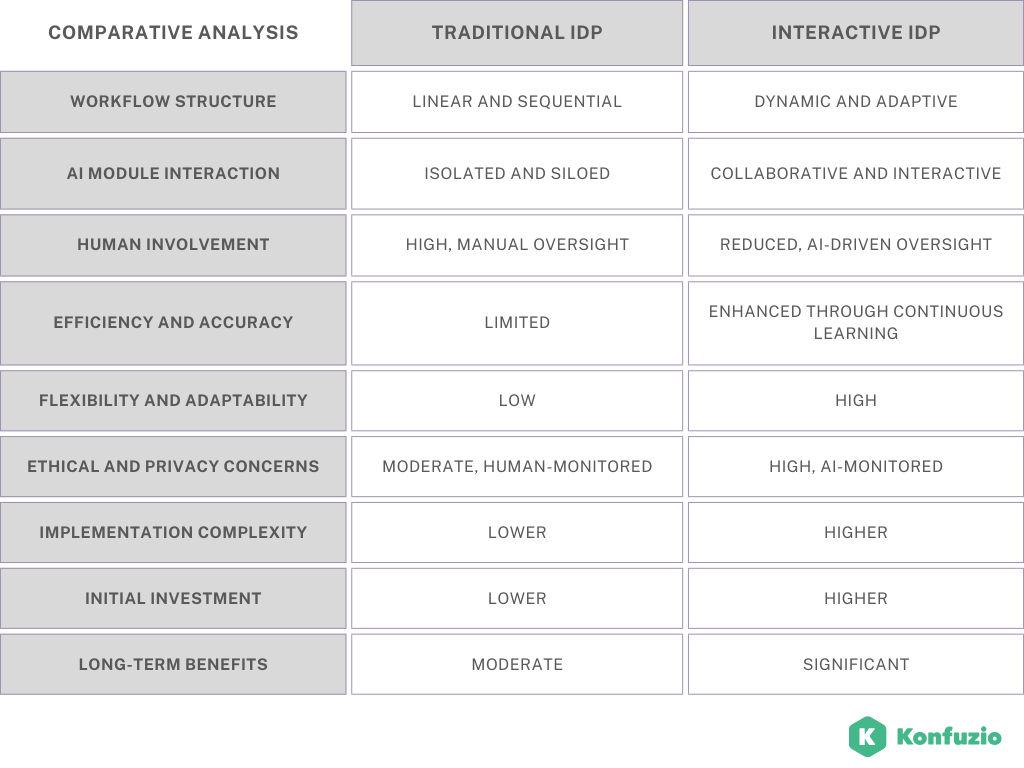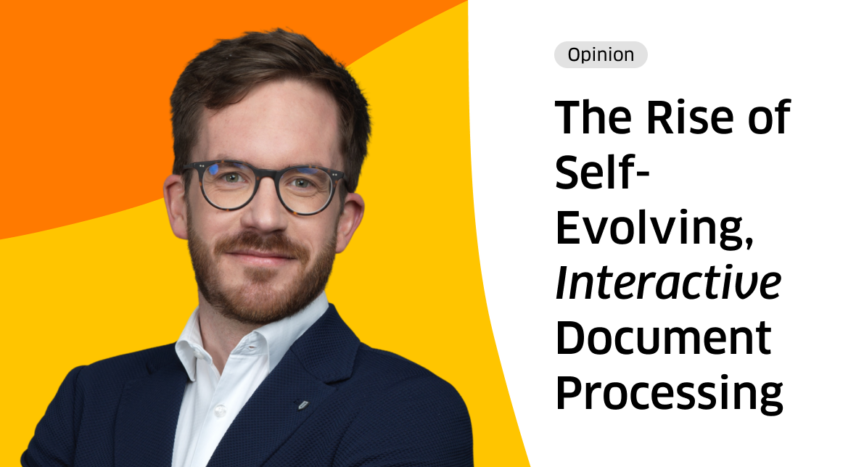Curious about what keeps experts, CEOs and other decision-makers in the Intelligent Document Processing (IDP) space on their toes? Get food for thought on IDP-related topics from the industry’s leading minds.
In this opinion piece, Christopher Helm, CEO of Helm & Nagel GmbH with its Intelligent Document Processing (IDP) solution Konfuzio, explains how IDP is evolving into a dynamic, feedback-driven ecosystem where autonomous AI systems continuously learn, adapt, and improve.
As we step into the future of Intelligent Document Processing (IDP), a revolutionary shift is on the horizon: No longer confined to linear workflows from point A to point B, IDP is evolving into a dynamic, feedback-driven ecosystem where autonomous AI systems continuously learn, adapt, and improve. This next level of intelligence is made up of the interaction of AI modules and humans, which promises unprecedented efficiency and accuracy.
Autonomous and Collaborative AI for IDP
Traditional IDP systems operate in a linear fashion, processing documents in predefined steps. In this way, however, the technically applicable intelligence of the systems is severely limited, as it hardly allows any flexibility for change and reaction. The ideal utilization of information can only be achieved through interaction. This applies to both humans and machines – or from now on: their symbiosis. This is made possible by the new methodology of autonomous and collaborative AI systems, which complement human-in-the-loop with an AI-in-the-loop approach:
These systems function in feedback loops, much like human interactions. They constantly communicate, share insights, and refine their processes based on real-time data and evolving contexts. Imagine multiple AI agents, each specializing in different aspects of document processing – one for data extraction, another for verification, and a third for contextual analysis. They work together, sharing data and feedback to improve the overall system’s performance. This collaborative approach not only enhances accuracy but also makes the system more resilient and adaptable to new challenges: Rigid A→B processes are transformed into agile A↔B↔C making AI, or specifically IDP, self-evolving and interactive.

Applications of self-evolving, Interactive Document Processing
The significance of any technological advance is determined by the sum and relevance of its applications:
Combat Misinformation: Verifying Document Authenticity
In an era where misinformation spreads rapidly, ensuring the authenticity of documents is critical. Autonomous IDP systems can play a vital role in this domain. Multiple AI agents can collaborate to verify the authenticity of documents through cross-referencing, pattern recognition, and anomaly detection.
For instance, one AI agent might specialize in detecting digital forgeries by analyzing metadata and document history. Another might focus on cross-referencing the content with trusted databases and sources. By working together, these AI agents can provide a robust verification process, significantly reducing the risk of misinformation.
AI Ethics: Navigating Privacy, Bias, and Accountability
As IDP systems become more autonomous, ethical considerations become paramount. Ensuring privacy, mitigating bias, and maintaining accountability are essential for building trust in these systems. Collaborative AI can help address these challenges by creating a transparent and accountable processing environment.
For example, an AI agent could be dedicated to monitoring and ensuring compliance with privacy regulations, while another focuses on detecting and correcting biases in data processing. Additionally, a supervisory AI could oversee the actions of other agents, ensuring that ethical guidelines are consistently followed and providing audit trails for accountability.
Fraud Detection in Financial Documents
Fraud detection in financial documents is a complex task that requires constant vigilance. Autonomous IDP systems can enhance fraud detection by using multiple AI agents to analyze transactions in real-time. One agent might detect unusual patterns in transaction data, while another cross-references these patterns with known fraud databases. A third agent could assess the contextual relevance of transactions, flagging those that deviate from established norms. This multi-faceted approach significantly improves the detection and prevention of fraudulent activities.
Dynamic Contract Management
Managing contracts is a tedious and error-prone process. Autonomous IDP systems can revolutionize contract management by using collaborative AI to ensure accuracy and compliance. One AI agent can handle the extraction of key contract terms, another can verify compliance with regulatory standards, and a third can monitor ongoing obligations and deadlines. These agents continuously interact, update, and refine their processes based on new data, ensuring that contracts are managed dynamically and accurately.
Personalized Healthcare Documentation
In the healthcare sector, personalized patient documentation is crucial for effective treatment. Autonomous IDP systems can tailor healthcare documents to individual patients by using multiple AI agents. One agent can extract and organize patient data, another can analyze medical histories, and a third can provide personalized recommendations based on the latest medical research. This collaborative effort ensures that healthcare providers have accurate, comprehensive, and up-to-date information for each patient.
Conclusion
IDP henceforth stands for Interactive Document Processing, whereby interactivity is to be understood as a combination of human and artificial intelligence. This next level lies in autonomous and collaborative AI systems that self-evolve. By operating in feedback loops and working together, they can achieve unprecedented levels of accuracy, efficiency, and adaptability. From combating misinformation to ensuring ethical standards, the applications of these advanced IDP systems are vast and transformative.
As we continue to push the boundaries of what is possible, the potential for autonomous IDP to revolutionize industries and improve our daily lives is limitless. Embracing this new paradigm will require not only technological advancements but also a commitment to ethical considerations and continuous learning. The journey towards fully autonomous and collaborative IDP systems is just beginning, and the future promises to be both exciting and challenging.

About the Author
Christopher Helm is CEO of Helm & Nagel GmbH, an international provider of artificial intelligence (AI) and new enabling technologies. Among those is the software Konfuzio, an AI-based platform for process optimization and data-based knowledge gain.
📨Get IDP industry news, distilled into 5 minutes or less, once a week. Delivered straight to your inbox ↓







